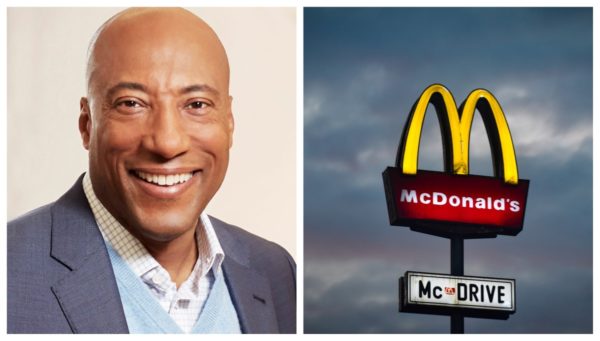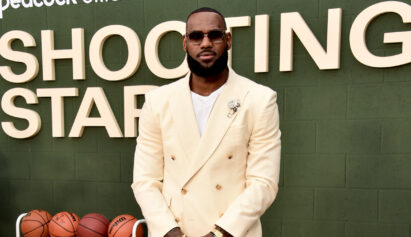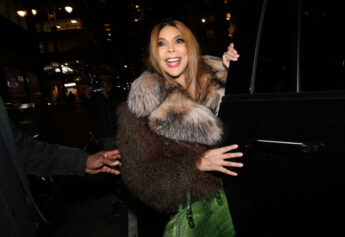Entertainment mogul Byron Allen has lost a legal battle against McDonald’s. A judge has dismissed Allen’s $10 billion discrimination lawsuit against McDonald’s.
Allen has an estimated net worth of $450 million, according to Celebrity Net Worth. Over the the past three decades the former comedian has built an entertainment and media empire. In 1993, he founded the Los Angeles-based television production company Entertainment Studios (also known as Allen Media Group) and launched his first series, “Entertainers with Byron Allen.”

It was a weekly, one-hour series profiling the stars of film and television. He steadily added cable stations and television shows to his acquisitions, and in 2018 he purchased the Weather Channel for $300 million.
Going against the usual model of charging networks fees to license their shows, Allen has built his fortune by selling 50 percent of advertising directly to networks, AfroTech reports. He lets networks license Allen’s shows for free, while he charges for advertising. That allows him keep more of the profits for himself.
Allen Alleges McDonald’s Doesn’t Spend Enough in Black Media
Even though Allen has many media outlets giving him advertising profits, he alleged in his lawsuit that McDonald’s refuses to advertise on his many cable channels. Allen also alleged that McDonald’s has refused to advertise on the Weather Channel and Entertainment Studios’ channels.
Allen claimed that McDonald’s only spent 0.3 percent of its $1.6 billion advertising budget on Black-owned media in 2019, Reuters reported. That’s despite the fact that African-Americans possibly make up 40 percent of the fast-food chain’s customers, according to Seeking Alpha.
In his discrimination lawsuit filed in May, Allen said that McDonald’s profits from Black customers, but doesn’t invest enough in Black-owned media.
“McDonald’s, like much of corporate America these days, publicly touts its commitment to diversity and inclusion, but this is nothing more than empty rhetoric,” said Allen in the complaint.
Allen said in a statement his lawsuit was pivotal to giving more economic equality to Black-owned businesses.
“This is about economic inclusion of African American-owned businesses in the U.S. economy,” said Allen.
“McDonald’s takes billions from African American consumers and gives almost nothing back. The biggest trade deficit in America is the trade deficit between White corporate American and Black America, and McDonald’s is guilty of perpetuating this disparity,” added Allen.
McDonald’s pledged to increase its advertising spending on Black-owned media to 5 percent of its ad budget by 2024 on the same day Allen filed his lawsuit.
Judge Rules That McDonald’s Didn’t Discriminate Against Allen’s Networks
On Nov. 30, Allen’s lawsuit was dismissed by U.S. District Judge Fernando Olguin in Los Angeles. Olguin ruled that Allen didn’t have enough evidence that he tried hard enough to get advertising money from McDonald’s. Olguin also said Allen didn’t prove that White networks similar to his received preferential treatment.
Allen’s lawyer, Louis “Skip” Miller, said that he would file an amended complaint.
“We will be adding more details to the complaint as directed by the court; and fully expect the case to go forward with discovery and trial,” said Miller.
Allen lost this latest discrimination suit, but settled a similar $20 billion bias suit against Comcast in 2020. In the lawsuit settlement, Comcast agreed to carry many of his channels, Hollywood Reporter wrote.
Black-Owned Media Often Doesn’t Get Investment from Advertisers
Many Black-owned business owners aren’t getting the same advertising spending white media is. A Nielsen Ad Intel Research study found that Black-owned media only received 2 percent of ad spending in 2020. Over the past few months, many large companies like GM pledged to double its Black ad spending to 4 percent by next year, according to Reuters.
Josh Rahmani, SVP of national and network sales for Urban One’s audio division, told Morning Brew that some businesses promised to spend more on the Black-owned media outlet, but haven’t followed through.
“Some brands and agencies that have committed to big numbers are starting to slowly spend more, and we’ve gotten some incremental dollars from them, but not necessarily the huge dollars they say they are going to spend,” Rahmani said. “We’re continuing conversations in hopes that we’re going to get there.”
Allen told Ad Age that advertisers need to make a commitment to allocate more of their ad budgets to Black-owned media to show they value African-American consumers.
“Every advertiser needs to pledge, needs to commit, a minimum of 2 percent of their ad budgets to Black-owned media. And if they don’t do a minimum, I think you’re saying very clearly to Black America and to Black American consumers that you don’t value us,” said Allen.
Even though Allen’s discrimination lawsuit was dismissed, the lawsuit brought much-needed attention to Black-owned media. Allen showed that Black-owned media deserves an increase in advertising dollars to reach African-American audiences.




